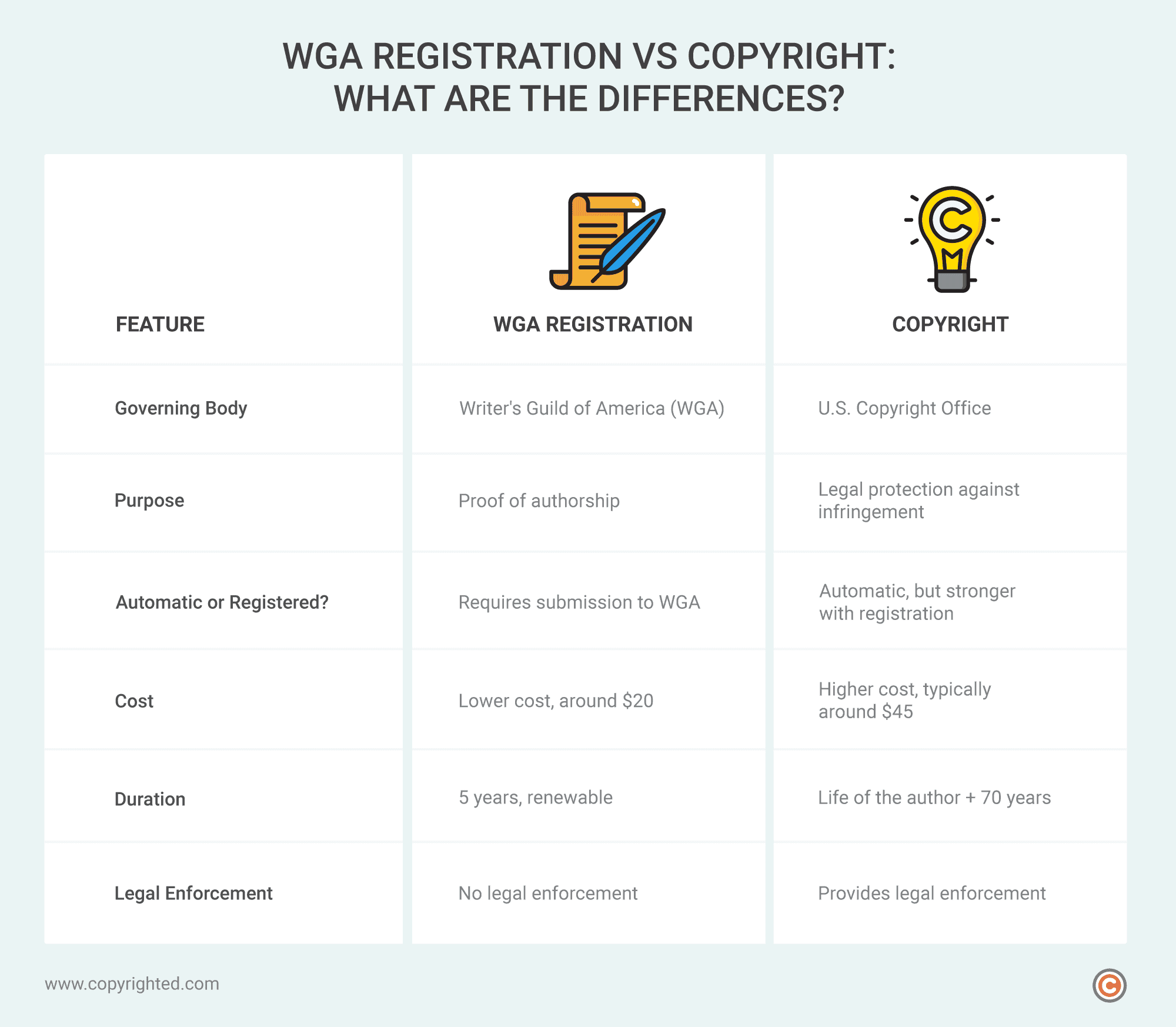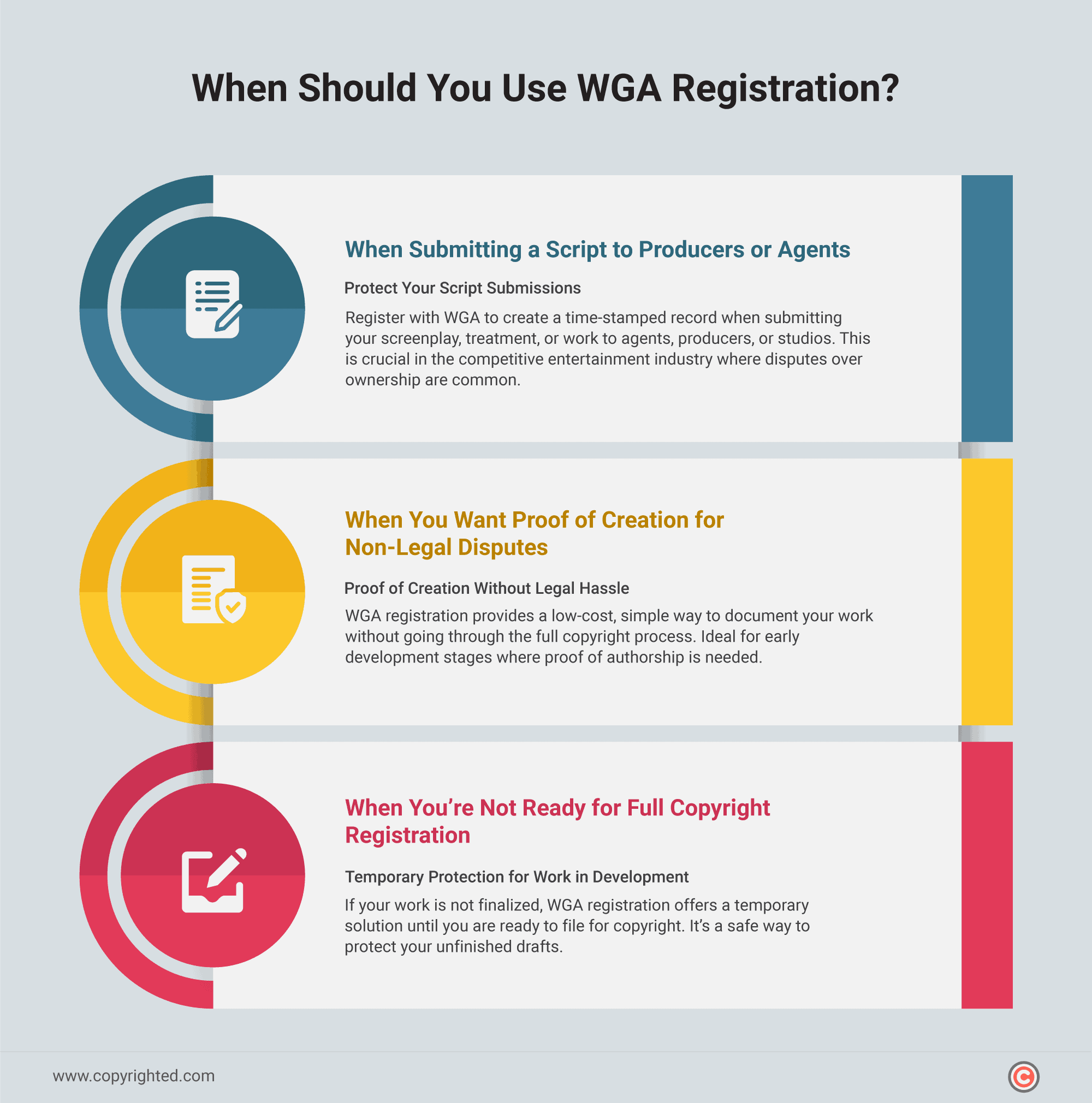As a creator, protecting your work is important, especially in fields like film, television, literature, and music, where ideas can be at risk of unauthorized use.
Two popular options for creators are WGA registration and copyright. While both offer protection, they serve different roles and have different functions, and understanding these distinctions will help you choose the best method for protecting your creative work.
Knowing the differences between WGA registration and copyright can help you decide when and why to use each. By the end, you’ll understand which option or a combination of both is best for protecting your work.
- WGA registration helps establish proof of authorship but does not grant legal ownership or the exclusive rights provided by copyright.
- Copyright automatically applies when a work is fixed in a tangible medium, but formal registration is necessary for legal enforcement and to claim damages.
- Combining WGA registration and copyright offers comprehensive protection, with WGA providing an early record and copyright securing long-term legal rights.
Table of Contents
WGA Registration vs Copyright: What’s the Difference?
WGA registration is a Writers Guild of America (WGA) service that allows creators to register works like scripts, screenplays, and treatments.
Its main purpose is establishing proof of authorship through a time-stamped record, which can be useful if authorship disputes arise, particularly in the film and television industries. However, WGA registration does not provide legal ownership or exclusive rights to the work like copyright does, as U.S. law does not recognize it as a substitute for copyright.
The WGA registration only serves as third-party evidence of when a work was created. At the same time, WGA clearly states that their registration does not replace copyright registration with the United States Copyright Office.
Copyright automatically applies when an original work is “fixed in a tangible medium of expression,” which includes literary works, music, art, films, and more. Copyright gives creators exclusive rights to reproduce, distribute, perform, display, and create derivative works from the original.
Although copyright is automatic, your work has to be registered with the Copyright Office to strengthen your rights.
Formal registration is required if you want to take legal action against copyright infringement. Registered copyright holders can also seek statutory damages and attorney’s fees, which are unavailable if the work is not registered.
Under 17 U.S.C. § 411, copyright registration is necessary before you sue for copyright infringement, giving copyright significant legal power compared to WGA registration, which cannot be used for such claims.
Here’s a quick rundown of the two:

When Should You Use WGA Registration?
WGA registration is especially useful for professional writers and creators in specific situations, particularly in the entertainment industry. Below are some instances where WGA registration might be the right choice.

When Submitting a Script to Producers or Agents
If you’re submitting a screenplay, treatment, or other written work to a producer, agent, or studio, WGA registration provides a time-stamped record of its creation.
This is an effective way to protect your screenplay in the competitive film and TV industry, where disputes over the origin of ideas are common. While both WGA and copyright registration can offer protection, WGA is particularly valuable in scenarios where proof of submission is essential.
When You Want Proof of Creation for Non-Legal Disputes
WGA registration is a simple and low-cost way to document the creation of your work.
It offers an easy way to create a formal record without going through the full copyright registration process. This is especially useful during the early development stages when you may not be ready to file for copyright but still want proof of authorship.
When You’re Not Ready for Full Copyright Registration
If your work is still in development and not yet finalized, it can be registered with the Writers Guild of America to serve as a temporary option. Copyright registration requires a finished version of the work, but WGA registration offers an interim solution while you refine your material.
When Should You Use Copyright?
Copyright protection is a key legal tool that grants creators exclusive rights over their work, allowing them to control its use, distribution, and display. Here’s when it’s crucial to rely on copyright to safeguard your work:
When Seeking Full Legal Protection
Copyright registration is necessary to fully enforce your rights over creative work. Under 17 U.S.C. § 102, copyright automatically applies as soon as your work is “fixed” in a tangible form, whether it’s a book, a song, or artwork.
However, registering your work with the US Copyright Office strengthens your legal position, particularly when disputes arise.
In some cases, creators may also opt for a lawsuit or credit arbitration to resolve copyright disputes, offering a faster and often less costly alternative to litigation. This makes registration essential if you anticipate disputes or need to protect your ability to seek damages.
When You Want to Protect Against Infringement
Copyright registration gives you exclusive rights under 17 U.S.C. § 106, including the right to reproduce, distribute, publicly perform, and create derivative works. If someone uses your work without permission, registering your copyright allows you to file an infringement lawsuit.
When You Have Completed a Work
Once your work is finalized, it’s the ideal time to register it for copyright. Copyright applies only to “fixed” works, so once your work is ready for public use or distribution, registration ensures lasting protection.
Registering the completed work establishes a public record of ownership, secures your rights, and enables you to transfer or license those rights to others.
For Published and Unpublished Works
Copyright covers both published and unpublished works, so you can still register it for protection even if your work hasn’t been publicly released. This is particularly useful for creators like filmmakers and musicians who want to guard their work during development.
Registering your unpublished work ensures it’s protected before its public release.
When You Want Long-Term Protection
Copyright registration lasts for the author’s life plus 70 years for individual works. Work created for hire lasts 95 years from publication or 120 years from creation, whichever is shorter.
This extended protection ensures control over your work for decades, benefiting you and your heirs.
When You Want to Protect Digital Content
In the digital age, copyright protects online content like blogs, videos, and digital art. Registering your copyright gives you legal leverage to stop others from copying or monetizing your work without permission.
Can You Use Both WGA Registration and Copyright?
Yes, you can use both WGA registration and copyright to protect your work, and doing so is often a smart strategy, particularly in industries like film and television, where works are frequently shared before they are fully developed. Each serves a different purpose but complements the other well.
For instance, if you’re screenwriting and working on a new TV show, you might initially register your script with the Writers Guild of America West (WGAW) Registry. This step creates a time-stamped record of authorship, providing clear legal evidence of when you write the script.
It is quick and inexpensive, which makes it ideal during the development phase when the script is shared with producers, agents, or collaborators.
Once the script is finalized and ready for distribution or sale, you, as the screenwriter, will also register it with the US Copyright Office for full legal protection. Registering the script for copyright gives the writer exclusive rights to reproduce, distribute, display, and create derivative works.
If someone uses the script without permission, the writer can pursue legal action and seek damages. This level of legal protection is not available through WGA registration alone. In this case, using both WGA registration and copyright provides comprehensive protection.
WGA registration establishes a clear authorship timeline, useful in case of disputes, while copyright offers the legal framework to enforce the writer’s rights. By combining the two, the script is protected from both early development risks and long-term legal threats.
Frequently Asked Questions
If you register your script with the WGA Registry, do you still need to copyright your work?
Yes, WGA registration does not provide full legal protection, so copyright registration is still necessary for enforcing your rights.
Can WGA registration help in copyright disputes?
WGA registration can provide evidence of authorship but cannot replace copyright in legal disputes.
Does WGA registration automatically include copyright protection?
No, WGA registration does not include copyright protection, copyright is a separate legal process governed by U.S. law.
Is WGA registration legally enforceable like copyright?
No, WGA registration is not legally enforceable, unlike copyright which grants legal rights to enforce protections.
How much does it cost to register with the WGA or the Copyright Office?
WGA registration typically costs around $20, while US copyright registration costs around $45.


